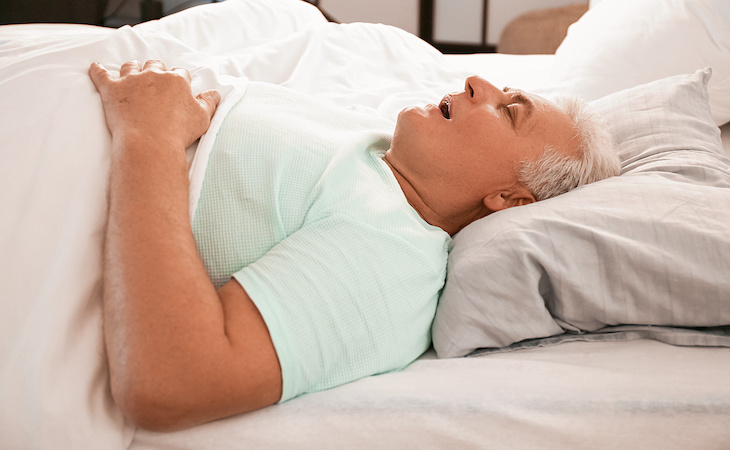Waking up with a dry mouth every once in a while is relatively common. “Occasional dry mouth during sleep is fairly normal and benign as our saliva production naturally decreases during sleep,” says Chester Wu, MD, who is double board-certified in psychiatry and sleep medicine and acts as the medical reviewer for Rise Science.
But even though dry mouth while sleeping is common doesn’t mean it’s comfortable—and, in certain situations, it could be indicative of a larger health problem.
So, what causes an extremely dry mouth while sleeping? What are the symptoms and potential complications? And how can you prevent waking up with a dry mouth?
Let’s take a look at everything you need to know about what causes extreme dry mouth while sleeping (and, just as important, how to prevent dry mouth while sleeping).
What causes dry mouth while sleeping?
Let’s start with what causes extreme dry mouth while sleeping. It turns out dry mouth while sleeping can be the result of a variety of factors.
“It can be difficult to pinpoint the cause of worsening or chronic dry mouth as there are many potential causes,” says Wu.
According to Wu, some causes of dry mouth while sleeping include mouth breathing, dehydration, sleep apnea, and certain medications, such as certain antihistamines.
Certain medical conditions may also be to blame. Wu lists Sjögren’s syndrome as an example of a medical condition that can cause dry mouth while sleeping.
It’s “an autoimmune disorder in which the body’s immune system mistakenly attacks its own moisture-producing glands, leading to dryness in the eyes, mouth, and other areas,” he says.
Alcohol (which can be dehydrating) and tobacco use (which dries out the mouth) can also lead to dry mouth while sleeping. Dry mouth can also be caused by the products you use before bed—including mouthwash.
“Using alcohol-based mouthwash is another contributor to dry mouth during sleep,” says dentist Jordan Weber, DDS, who runs Burlington Dental Center in Kansas. “While the alcohol gives you the fresh feeling immediately after using the mouthwash, it also contributes to dehydration of the gums, tongue, cheeks, and oral tissues.”
Symptoms of dry mouth while sleeping
Clearly, dry mouth while sleeping can have several causes. But what does it feel like? Or, in other words, what are the symptoms of dry mouth while sleeping?
“Symptoms of a dry mouth include a sticky or parched feeling in the mouth, frequent thirst, sores in the mouth, cracked lips, and a dry throat,” says Wu.
Other symptoms of dry mouth while sleeping include:
- Bad breath
- Difficulty swallowing
- Hoarseness or difficulty speaking
- Unpleasant taste in the mouth
- Thick saliva
- Sleep disturbances
Complications of dry mouth while sleeping
Again, waking up with a dry mouth on occasion is fairly common. But if the issue starts happening more than occasionally—and, instead, becomes chronic—then there could be some potential complications.
As mentioned, dry mouth can lead to challenging symptoms, like mouth sores, cracked lips, and bad breath. It can also have an impact on overall mouth health—more specifically, tooth and gum health.
“Saliva has antibacterial properties and helps in the digestion of food,” says Wu. As such, “persistent dry mouth can increase your risk of dental issues like cavities and gum disease due to reduced saliva production.”
On top of that, “an untreated chronic dry mouth, alongside its various symptoms, has the potential to disrupt your sleep,” says Wu. And dry mouth-related sleep disruptions can lead to poor sleep overall—which can wreak havoc on your health.
How to prevent dry mouth while sleeping
Wondering, “How can I stop dry mouth while sleeping?” The good news is, there are steps you can take to avoid the issue.
“The simplest fixes for dry mouth are staying hydrated, avoiding alcohol-containing mouthwashes, avoiding alcohol and tobacco products, and using salivary aids—such as artificial saliva lozenges, gels, and sprays—before bed,” says Weber.
Additionally, Wu recommends staying hydrated throughout the day, using a humidifier at night, and addressing potential mouth breathing issues, possibly through the use of nasal strips or daytime nasal breathing exercises.
If, after attempting to solve the issue on your own, your dry mouth while sleeping persists, then it may be time to talk to your doctor—as your dry mouth may be related to an underlying condition or medication. (This is especially true if your dry mouth happens alongside other symptoms.)
“Persistent or worsening dry mouth should prompt further investigation [with a medical professional], especially if your dry mouth symptoms are accompanied by other symptoms like throat pain, difficulty swallowing, a hoarse voice, excessive daytime sleepiness, loud snoring, frequent waking up at night, or any systemic symptoms like joint pain or dry eyes,” says Wu.
FAQs
Why am I getting extremely dry mouth at night?
Extreme dry mouth at night can be caused by a variety of factors, including lifestyle choices (like alcohol or tobacco use), dehydration, or certain medications and/or medical disorders. If you’re not sure why you’re waking up with an extremely dry mouth, then you may want to consider talking to a medical professional for deeper insights.
What does waking up with a dry mouth indicate?
Waking up with a dry mouth can indicate a variety of things, including mouth breathing through the night or an adverse reaction to a medication. If you’re unsure what’s causing your dry mouth while sleeping, then it may be best to speak to your doctor.
How can I stop dry mouth while sleeping?
You can help prevent dry mouth while sleeping by avoiding alcohol and tobacco, steering clear of alcohol-based mouthwashes, using salivary aids (such as lozenges, gels, or sprays), placing a humidifier in your bedroom, and addressing potential mouth breathing issues.
Next, find out what causes drooling during sleep and how to stop it.




